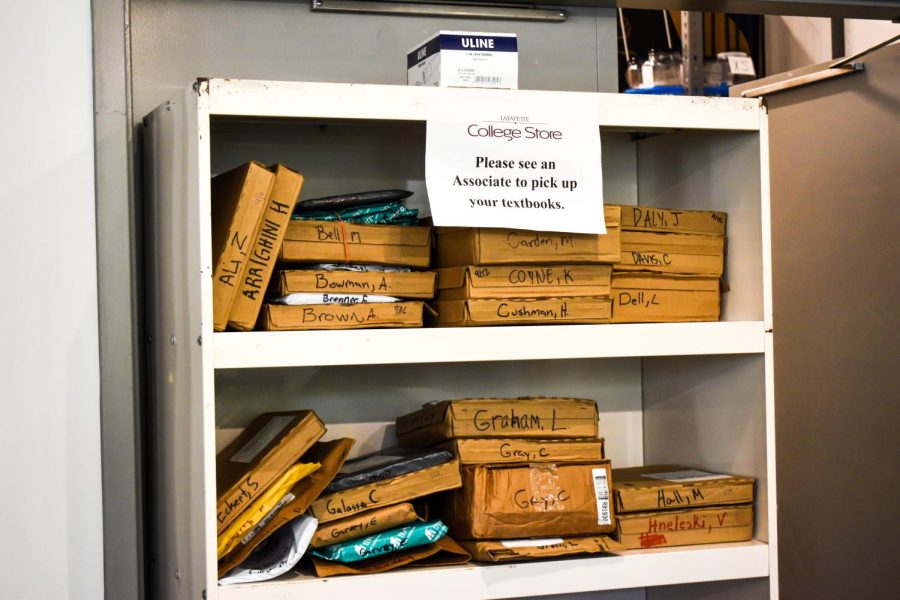In September, assistant manager of the College Store Pete Violante said that supply chain issues, over-registration and even professors are to blame for students not receiving textbooks on time.
Professors, however, say that none of the above are truly the cause of this problem.
“People who were more interested in finance than the educational mission of the college decided to design a new bookstore that did not include books,” history professor Joshua Sanborn said. “It sends the wrong message about what we are as an educational institution.”
Prior to the College Store being redesigned to exclude textbooks, professors would send a list of books to the store, where the manager would order and stock them for students to pick up in the store.
“If you dropped the class, you could return them, and there was a two-week return period,” Sanborn said. “The advantage of that system was that students could wait until they got on campus to see what books they needed, and if they added and dropped classes, they could just go to return one set of textbooks and buy a new set. And it was all right there.”
History professor Rebekah Pite said that she encountered a perplexed freshman looking for books at the College Store. “I explained to her where they were giving out the books that had been pre-ordered, but that she wouldn’t actually be able to get them,” Pite said. “I think that’s a huge problem, especially at a liberal arts college.”
In May 2020, the college announced that the College Store would no longer stock textbooks. Instead, they would outsource them from an independent company.
“As far as I’m aware, the process actually started in the 2018-2019 academic year, which actually predates me, even,” Provost John Meier said.
Professors now submit lists to a company that is supposed to deliver books to students upon ordering them. However, students have raised concerns that they are not receiving books on time, causing difficulties in keeping up with course expectations.
“Getting a textbook on time can be the difference between a pass and a fail,” Ellie Spencer ‘26 said. “Ordering books is really a pain.”
These frustrations leave students wondering what is being done to combat the problem.
“People had questions [during the process] and questions were addressed, but no one was bringing forward concerns. The faculty committees didn’t say we shouldn’t do this, or anything like that,” Meier said.
Sanborn said otherwise.
“I raised this issue with the Provost and a department heads meeting before it was fully implemented,” Sanborn said. “I was just saying, ‘Look, this is not going to serve students well. They are going to have difficulties when they are adding and dropping classes.’ But the Provost dismissed those issues and went full steam ahead.”
Meier is the chief academic officer of the College. He partners with the President and the Cabinet to oversee the College’s mission while maintaining budgetary authority.
“This semester, I heard from one faculty member that had some, I don’t know if I call it a complaint so much as, ‘here’s another way we can go about doing some of this,’” Provost Meier said. “It’s hard for me to diagnose a problem when actually I haven’t heard anything about the problem except from one instance.”
Professor Pite said that it is her impression that faculty were not really consulted about this decision.
“When our department met with the President, one of the key points I tried to make to her is that a liberal arts college like ours should really have a thriving bookstore, not just so students can get the books for their classes, but also so they can potentially see and purchase other books. And I was really dismayed to see when our college store opened that at first there were no books at all,” she said.
Sanborn said he was also adamant with the administration that outsourcing books would become a problem.
“I’ve brought this up in meetings with [the administration] on repeated occasions,” Sanborn said. “And they have clearly said, ‘we’re not changing our minds.’”
“Maybe they reached out to me last semester and things didn’t get resolved the way they wanted them to be resolved,” Provost Meier said. “It can happen.”
Though professors were not provided with a reason for the restructuring of the College Store, some have their own ideas about why this change was implemented.
“My suspicion is it does have to do with profitability,” Professor Pite said. “But we are a nonprofit educational institution. And I would say this is an instance where it makes more sense to show our commitment to education over perhaps a small difference in profit.”
Another complicating factor is that students may be disproportionately affected by the decision to outsource textbooks depending on their area of study.
“I think part of the issue may be a bit divisional,” Pite said. “Students who take classes primarily in the STEM fields often have textbooks. And they’re often the same textbooks or maybe they’re even electronic or open access, making the ordering and acquiring of books a little bit more straightforward. But as you know, if you’re taking humanities classes, the books will vary quite a bit from course to course.”
While Sanborn and Pite are part of the history department, Meier is in the math department.
“Our current Provost is a mathematician,” Pite said. “I think his experience might be shaping a little bit how he thinks about it, while at the same time, our experience in our discipline is shaping, for example, how Professor Sanborn and I think about it.”
Provost Meier said that concerns are always taken into consideration.
“I know that the folks in the bookstore are happy to think about what are some alternate ways we could go after doing some of these,” Meier said.
According to Vice President for Finance & Administration Craig Becker, the College Store is currently undergoing renovation, including an expansion of shelving which should be complete by November, so that books written by faculty can be sold.
“We’re always looking at how we can improve service. We think that the online book ordering is a good approach for a college our size. We just have to make sure that it’s working the way that we intended it to,” Becker said.
Though different narratives have been told to students through different administrative perspectives, the bottom line is that the textbook ordering process has left many people frustrated.
“I hope [this knowledge] might lead to some kind of solutions,” Pite said. “I think the current way we’re doing it is far from ideal.”























































































































Sue Christiansen • Oct 22, 2022 at 12:19 pm
Well done Jenny…we are impressed with your thoughtful inquiry of college pertinent personnel and cohesive clear argument. Keep up your excellent inquiry and writing…we will want to know how it is received and any change it inspires.
Your Minnesota supporters and friends,
Sue and Tom Christiansen
Andrea Smith • Oct 23, 2022 at 9:04 pm
Yes, excellent article! I was baffled to find no books at the “book” store when I came back from sabbatical. Maybe the name should be changed to “t-shirt store”?